- Home
- Mack Reynolds
Deathwish World Page 4
Deathwish World Read online
Page 4
MacDonald brought forth a booklet, opened it, and took a stylo from the pocket of his shirt. “Sign this receipt,” he said.
Frank scanned it quickly. One thousand pseudodollars in gold Swiss francs.
As he signed, he said, “What do they use as a means of exchange in Tangier?”
“They use currency,” Roskin said. “In Morocco, it’s the dirham. Five dirham are approximately one pseudodollar.”
MacDonald returned his receipt booklet to his pocket, brought forth some small gold coins, and counted them out into Frank’s outstretched hand. “There’s your severance pay,” he said.
Frank said, “I owe you one for that bribe you gave the official.”
“Never mind,” the IABI man said, amused. “Let’s say it’s on me.”
That set Frank back. He looked down at the small number of Swiss coins in his hand and looked at one to check its denomination.
“How many francs to the pseudodollar?” he said, scowling.
“Two,” Roskin told him.
Frank calculated quickly and looked up. “This comes to only two hundred pseudodollars.”
MacDonald said to his fellow agent, “He’s not only an intellectual but a mathematician.”
“I’m supposed to get a thousand,” Frank said, his voice tight.
MacDonald scoffed at him. “What’d you do with a thousand pseudodollars? Probably waste it. Go through it in a week. As it is, Roskin and I will lay over in Madrid on our way home, and we’ll hoist a couple of drinks to you in Chicote’s.”
Frank stared from one of them to the other. “You miserable bastards,” he said, his lips going white. He took a step forward.
The other two stepped back warily, and Roskin’s hand slipped inside his jacket.
MacDonald said, his voice low, “You know what the Moroccan police would do if we shot you, here and now? Exactly nothing; they couldn’t care less. Your type is a dime a dozen in Tangier.”
As Frank glared, Roskin smiled. “Over there’s the exit to the taxi stand. The fare into town is five dirhams. Don’t pay more. You can’t trust these gooks.”
The two IABI men turned and left him standing there. Frank Pinell glared after them for a long moment. There was nothing he could do. Sure, once he got organized, he could write a letter of protest to Judge John Worthington. And a fat pile of crap that’d get him. He’d been silly enough to sign the receipt for one thousand pseudodollars, hadn’t he? Signed it before getting the funds in his hands.
He picked up his bags, made his way to the cambio booth, and exchanged fifty Swiss francs into dirhams. The Moroccan money came in coins rather than paper currency.
From the money exchange booth he went on through the door to the taxi stand. The driver was a small, evil-looking type with a dirty rag of an orange turban wrapped carelessly around his head. The garment he wore looked like a seamless bathrobe made of brown homespun and there were yellow, backless leather slippers on his feet.
Frank looked in the window of the ancient cab, even as he sharply slapped the hand of an urchin who was trying to pick his pocket. He said, “Do you speak English?”
The cabby’s shifty eyes took him in, evidently deciding his potential fare was American, rather than British. He said, “I talk everything, Jack.”
Frank put his bags in the back of the small cab and sat up front next to the driver. The cabby evidently wasn’t accustomed to bathing. Frank rolled down the window and said, “Take me to the cheapest hotel in Tangier.”
The other grinned at him, displaying teeth like a broken-down picket fence. “The cheapest European type hotel, eh, Jack?”
“The cheapest hotel, period,” Frank said definitely.
“You ever slept in a caravansary, Jack? Very cheap. One dirham a night. You sleep on a pile of straw, eh? Twenty other people in the same room, eh? Donkeys and goats, sometimes maybe even a camel. Other people are Rifs, down from the mountains to bring their things to the souk to sell, eh? Very bad people, some of these Rifs. Stick a knife in you if they figure you got ten, maybe twenty dirhams in your pockets.”
Frank sighed. “All right, take me to the cheapest European hotel,” he said in surrender.
The cabby dropped the lift lever of the prehistoric cab and, when they were aircushion borne, tromped on the accelerator, at first without result. He kicked it viciously and they started up. The American realized that the vehicle must be battery powered, rather than using power packs or picking up juice from the highway. Obviously, the gravel road wasn’t automated. However, from what he had read, Morocco wasn’t energy-poor. At least a third of the southern stretches of the country were in the Sahara and, in common with neighboring Algeria, the Sherifian Empire of Morocco had been among the first to use major solar power stations with Reunited Nations assistance. Endless square miles of them had been built before the satellite solar power stations began microwaving energy down from orbit.
He had thought himself prepared for poverty of the North African variety, but he wasn’t. He couldn’t imagine any American being so prepared. The thought came to him: could parts of Latin America have been like this, before joining the United States of the Americas?
From time to time, they passed small communities consisting of single-room dwellings made of wood scraps, cardboard, tin cans beaten flat, small boulders, and mud. There was no pretense of streets, or even alleys, obviously no running water, and garbage and refuse lay heaped in filthy piles, often with naked children playing on their summits. Flies and other insects droned in such swarms that Frank rolled up the window again, despite the stench of his driver.
The cabby grinned evilly over at him. “Not so good, eh, Jack?”
Frank didn’t answer.
After suburbs of such appalling filth, Tangier itself came as a surprise. The part of it they entered was European in appearance, rather than Moslem. That figured. The French had once owned this town on the Straits of Hercules, even before the International Zone. And the French might have loony logic, but they didn’t live in midden heaps.
The driver assumed the role of travel guide. “This is Route de Tetouan, eh, Jack? And this here we come into is Place d’Europe.”
They proceeded to the right and merged into what street signs proclaimed to be the Avenue de Madrid. At least, that’s what the French proclaimed. Frank couldn’t decipher the Arabic scrawl.
They turned left on the Boulevard Mohammed Fifth. The city continued to improve, and now there was considerably more traffic. Tangier had no restrictions on surface traffic. From time to time they were even held up by minor traffic jams. Most of the cars and trucks seemed as elderly as the hovercab.
“Pasteur Boulevard, she the center of European town, eh? She just two streets up. You like, I think. Cheap hotel.”
They turned down Rue Moussai Ben Moussair, barely wide enough for two vehicles to pass, and two blocks later pulled up before a sadly decrepit four-story structure.
“Hotel Rome,” the driver said expansively. “Very cheap. Almost clean. Not much bugs, eh, Jack?”
Frank looked out blankly. “Where?” he said.
“She’s on second floor, third floor, fourth floor. You don’t pay more than ten dirhams, eh? Luigi, he’s a crook. He try to charge you more, eh? You can’t trust Italianos. Okay, Jack. That’ll be fifteen dirhams, Jack. Cheap. All the way from the airport.”
Frank got out of his side of the cab, brought forth his Moroccan coins, and handed six dirhams through the window. “The rate’s five dirhams and here’s one more for a tip,” he said.
The other was furious. “Fifteen, you cheap Yankee,” he yelled.
“Five,” Frank said flatly and reached for the door to the back of the hovercab to recover his bags.
Before he could get it open, the vehicle surged ahead, wrenching his hand from the doorknob and nearly knocking him sprawling.
His eyes bulging, Frank stared aghast at the hovercab careening up the street with his luggage. He searched desperately for its license plat
e, and could see none. His eyes darted around to other vehicles parked in the street. None of them had license plates. Evidently, there was no such thing in the International Zone of Tangier.
He groaned audibly. He knew nothing about the layout of this town. He didn’t know where he could find the police. He didn’t know the cabby’s name. And the taxi looked like every other one he had seen in this—this ripoff Mecca.
He stood there, staring after it, until the vehicle swerved around a corner and was gone from sight.
Less than two hundred pseudodollars to his name and his every belonging stolen.
He finally took a deep breath and turned. Now he could make out the faded sign for the Hotel Rome. It was over a drab wooden stairway. The ground floor of the building was taken up by two stores which seemed almost identical. They resembled, in their window contents, the general stores in American small towns of long ago, selling everything from groceries to textiles, and toys, liquor, non-prescription drugs, shaving supplies, and what not.
The lobby of the Hotel Rome was on the second floor. Only one window overlooked the street. It was furnished with an aged reception desk, keys openly displayed on a rack behind it, and several thoroughly defeated chairs, their upholstery looking as though wild animals had savaged it. In one of the chairs snored an obese man, as disreputable as the furniture. “Hey!”
The other opened first one eye, then the other. He brushed a fly from the top of his almost bald head and looked accusingly at the man who had awakened him. What do bald, fat Italians dream of, Frank wondered.
“Who do I see about getting a room here?”
“Me,” the other grunted, somehow getting his bulk erect. “I’m Luigi. This place, it’s mine.”
Frank said, “I want the cheapest room you’ve got.”
Luigi took him in, his plump face expressionless. “You got no luggage? You pay right now. Twenty dirhams.”
“Ten,” Frank said wearily, fishing in his pocket for two five-dirham coins.
“This way,” Luigi said, shrugging.
The room was on the same floor as the lobby. It had one primitive electric bulb hanging from the ceiling, one sagging bed, one straight chair, one chipped dresser with a drawer missing. No bath, nor running water. Not even a window. There was a toilet down the hall, but no bath there, either. Seemingly, the tenants of the Hotel Rome didn’t bathe, unless they managed a sponge bath out of the filthy lavatory, crammed next to the toilet bowl.
When Luigi was gone, Frank Pinell looked about his room.
“Home at last,” he said acidly, running a hand down over his long face.
In another part of town, a stranger to Frank Pinell was speaking into his pocket transceiver. He was saying, “He pulled in on the three o’clock from Madrid. At the airport, those sons of bitches, MacDonald and Roskin, pulled their usual little romp. He got into Hamari’s cab and Hamari took him to Luigi’s and was able to take off with his luggage. He must be running scared by now. It looks as though we’ve found our patsy.”
Chapter Three: Roy Cos
Roy Cos looked out over the small, shabby hall in Baltimore with its pitiful group, members of the Industrial Workers of the World—“Wobblies,” in their own jargon. Inwardly, he felt depressed and weary. It was the same old story: there were sixteen in the audience. At least ten of these were either Wobblies or sympathizers who had heard or read all that he had to say a hundred times. They were there not to learn but to give him support. Another two or three, looking bored, had drifted in from the street out of mild curiosity, or because they had nothing else to do. Another trio, seated together at the rear with identical condescending sneers, were hecklers come to give him a bad time. Only one stranger, who sat in the last row on one of the rickety folding chairs, looked at all like promising material. He was a small man, better dressed than the prole audience, and he had a notepad on his lap. From time to time he took notes. But for all Roy Cos knew, the man could be an IABI agent checking out just how subversive the speaker might be.
Roy took in the tattered banners which the committee members had hung about the walls. SOLIDARITY! UNITE! And, the longest of them all, PEOPLES OF THE WORLD UNITE. YOU HAVE NOTHING TO LOSE BUT YOUR CHAINS. Roy Cos knew that such signs had once read, WORKERS OF THE WORLD UNITE. But there were no workers any more, for all practical purposes. Over ninety percent of the population was on GAS. Two percent were affluent members of the upper class, who did not worry about employment. And five percent were actually all that were needed to produce an abundance of goods and supply the services of this automated, computerized society. And they, the professional technicians, engineers, scientists, doctors, and teachers, seldom thought of themselves as workers. Their pay was such that they identified with the upper class, rather than the proles on GAS.
Roy Cos, a second-generation radical, was in his early forties. He was an outwardly average, unprepossessing man, faded brown of hair, hazel of eye, earnest of expression, but projecting a hint that somehow he realized that life had passed him by and that his efforts were meaningless in the long run. He was some ten pounds overweight. Too many hours studying, too many hours sitting around tables, arguing dialectics, too many hours talking, talking, talking, largely to people not really interested in blueprints of Utopia.
He was saying: “And is this the final destiny of man? The overwhelming majority living on the verge of poverty? The history of the human race has been a hard and proud one. Since first our ancestors emerged from the caves, we have fought upward. And from the beginning we have been the thinking animals, the tool users. Who first utilized fire, we cannot know. What early men first developed the hand ax, the knife, the spear, the bow and arrow is unknown to us. But each generation that came along added its contribution to human knowledge and we slowly acquired agriculture, the domestication of animals, the wheel, the hoe, the plow. And as each generation emerged, its geniuses now forgotten, our knowledge grew. The arts and the sciences began to emerge.”
“Great!” one of the three cynical listeners called out. “So what? Get to the point.”
Roy nodded and went on. “The point is that all of these developments, this accumulated knowledge down through the centuries, is the common heritage of all mankind. They are not the property of a few, but of the race as a whole. A modem, automated factory is possible only because these tools were handed down to us over the centuries. The products of modem society should be the common property of the race, not of a mere fraction of it. And if this is true, where is justice today when a few live idle, in luxury, while the rest of us are forgotten? As John Ball, centuries ago, put it in a sermon to English poorer class rebels:
“‘When Adam dalfe and Eve span Who was thanne a gentil man?’”
The stranger made a note on his pad. He was thin, gray-faced, probably in his mid-forties, and Roy largely directed his talk toward the man. If you could make one convert at a typical Wobbly meeting you were doing fine. One valid convert, potentially an activist, would more than pay for an otherwise depressing evening.
He went on to explain the Wobbly program: organizing all presently employed workers so that they could use the only clout that really counted—the control of production, distribution, communications.
When the question period came, the chairman took over again. No one seemed prepared to ask an initial question of the speaker. As usual, in such a case, one of the Wobbly members stood up and started the ball rolling.
He said, “Since so few people support the Wobbly program, won’t it take one hell of a long time for it to ever come about?”
Roy took over the podium again, nodded, and said, “Good question. And the answer is, no… not necessarily. What counts is the correctness of the program, the extent to which it solves our common problems. Our support can grow very quickly, given a breakdown in the current system and an obvious need for change. Take the American Revolution of 1776, for instance. Had you suggested to the average colonist in 1774 that he needed to throw off the rule of King George
in favor of an independent union, he probably would have taken a patriotic swing at you. But the need was there and, overnight, a handful of farseeing men like Tom Paine, Sam Adams, Jefferson, pointed out the way. The revolution wasn’t long in coming.”
One of the hecklers held up his hand. When Roy Cos recognized him, he came to his feet and yelled, louder than was called for, “Aren’t you people just a bunch of soreheads? There’s only so many jobs around these days. The computers select the best men and women to hold them. Those that get jobs, deserve the extra money. The rest of us are lucky to get GAS. It’s a pretty good system when everybody eats regular and is taken care of, even if he’s not chosen for a job. What the hell are you beefing about?”
Roy nodded, and paused a moment before answering. “In the first place, let’s not give those computers more credit than they deserve. Science is great but it mustn’t be a sacred cow. Computers can be programmed into shortcomings.”
“Like what!” one of the hecklers called out. His friends laughed, backing him. Several of the Wobblies, seated down front, turned and glared at them.
Roy said, “Well, let’s take a couple of scientists that the computers would have passed by. Two of their big requirements are a good education and a top-notch Ability Quotient. Thomas Edison had only a couple of years of formal education—he never got through grammar school. The computers wouldn’t have picked him for a job. Steinmetz was a hunchback cripple, in spite of his I.Q., and would never have gotten a high Ability Quotient, much of which depends on physical attributes.
“But science isn’t the only thing. Lincoln had practically no formal schooling and wouldn’t have been chosen. Winston Churchill was a rotten student. Among writers, Jack London had very little schooling and was an alcoholic from his teens onward. O. Henry, poorly educated, also had a prison record. Scott Fitzgerald was a dropout at Princeton and never did learn much grammar, spelling, or punctuation. Hemingway finished high school but certainly took no honors there. Let’s face it: few outstanding artists, musicians, or actors would stand up to the scrutiny of the computers. No, I’m afraid the computers are not yet programmed for judging the arts. And we Wobblies look forward to going further into the arts as well as the sciences. Millions of citizens could be employed in the arts.”

 Happy Ending
Happy Ending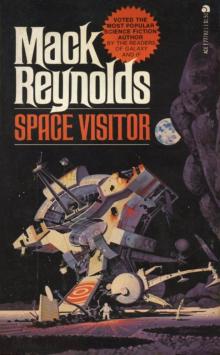 Space Visitor
Space Visitor A Kiss Before Loving
A Kiss Before Loving Episode on the Riviera
Episode on the Riviera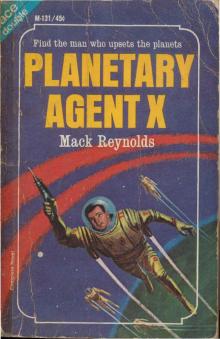 Planetary Agent X
Planetary Agent X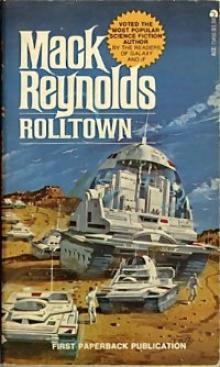 Rolltown bh-3
Rolltown bh-3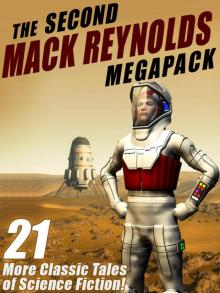 The Second Mack Reynolds Megapack
The Second Mack Reynolds Megapack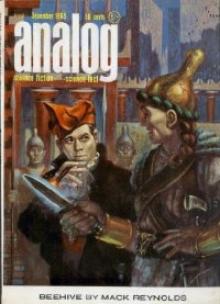 Dawnman Planet up-2
Dawnman Planet up-2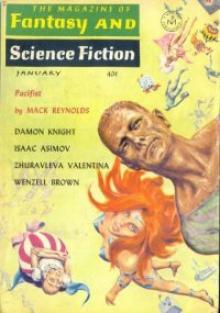 Pacifist
Pacifist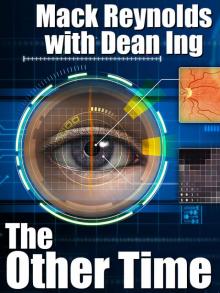 The Other Time
The Other Time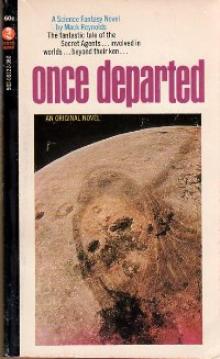 Once Departed
Once Departed IQ
IQ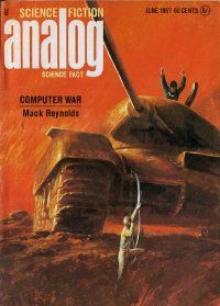 Computer War
Computer War Earth Unaware
Earth Unaware The Rival Rigelians up-3
The Rival Rigelians up-3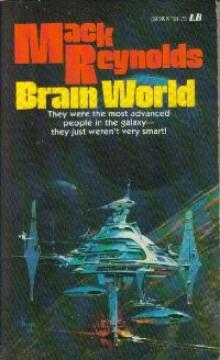 Brain World up-7
Brain World up-7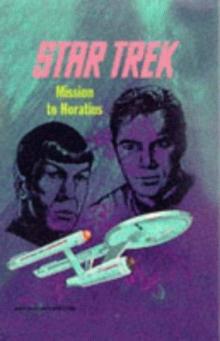 Star Trek - TOS - Mission to Horatius
Star Trek - TOS - Mission to Horatius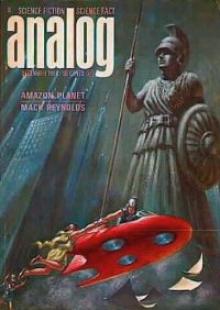 Amazon Planet up-5
Amazon Planet up-5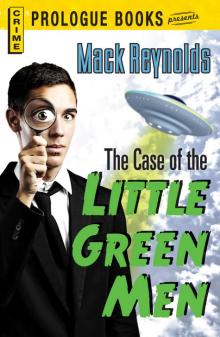 The Case of the Little Green Men
The Case of the Little Green Men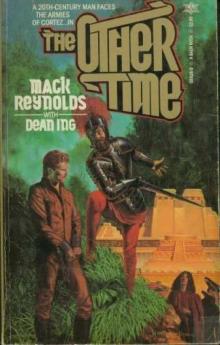 Other Time
Other Time The Mack Reynolds Megapack
The Mack Reynolds Megapack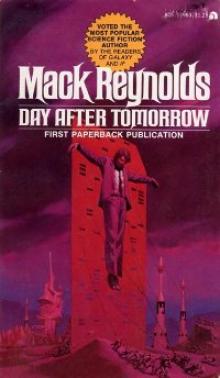 Day After Tomorrow
Day After Tomorrow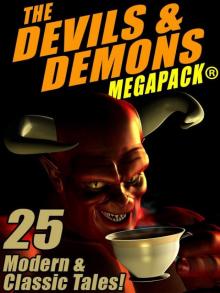 The Devils & Demons MEGAPACK ®: 25 Modern and Classic Tales
The Devils & Demons MEGAPACK ®: 25 Modern and Classic Tales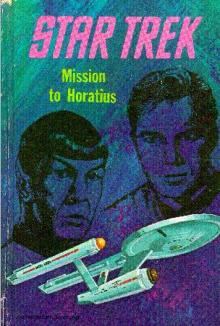 Mission to Horatius
Mission to Horatius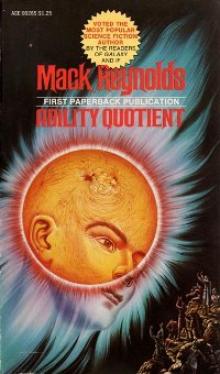 Ability Quotient
Ability Quotient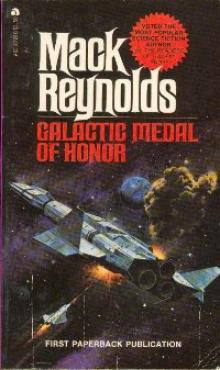 Galactic Medal of Honor
Galactic Medal of Honor Trojan Orbit
Trojan Orbit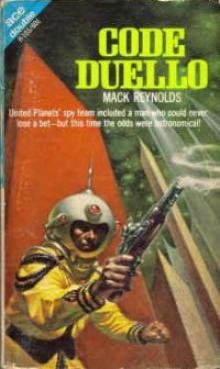 Code Duello up-4
Code Duello up-4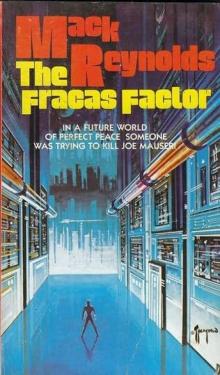 The Fracas Factor
The Fracas Factor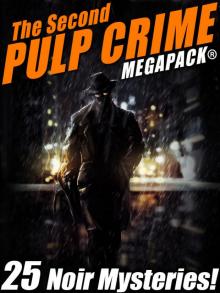 The Second Pulp Crime
The Second Pulp Crime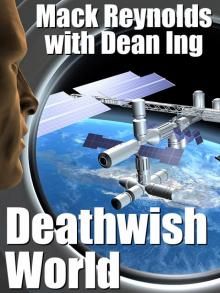 Deathwish World
Deathwish World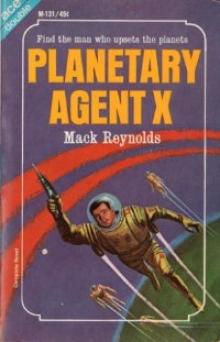 Planetary Agent X up-1
Planetary Agent X up-1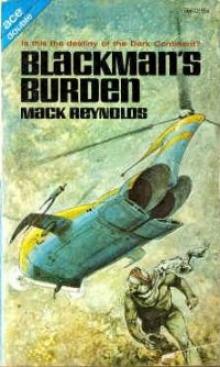 Blackman' Burden na-1
Blackman' Burden na-1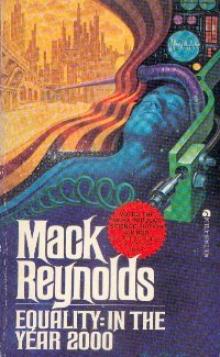 Equality: In the Year 2000 jw-2
Equality: In the Year 2000 jw-2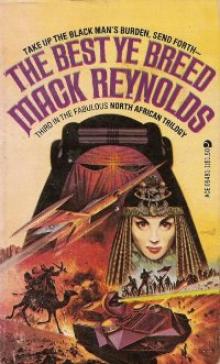 The Best Ye Breed na-3
The Best Ye Breed na-3 The Jet Set
The Jet Set The Rival Rigelians
The Rival Rigelians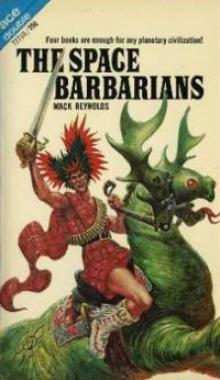 The Space Barbarians
The Space Barbarians